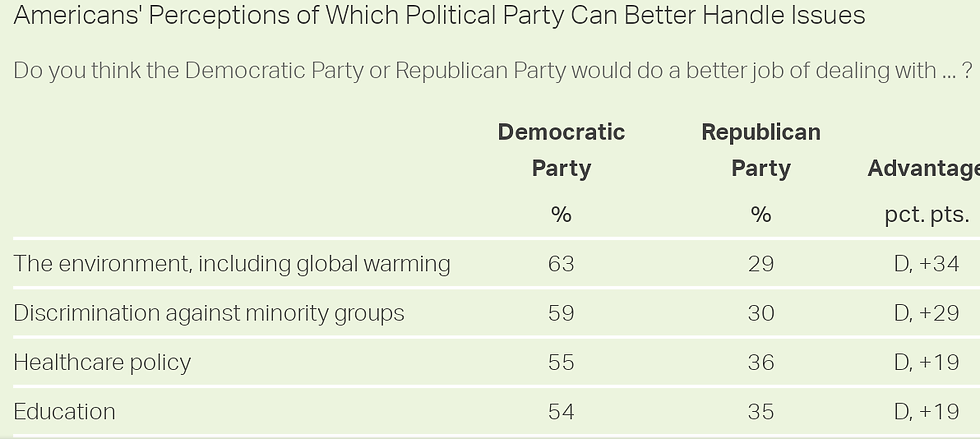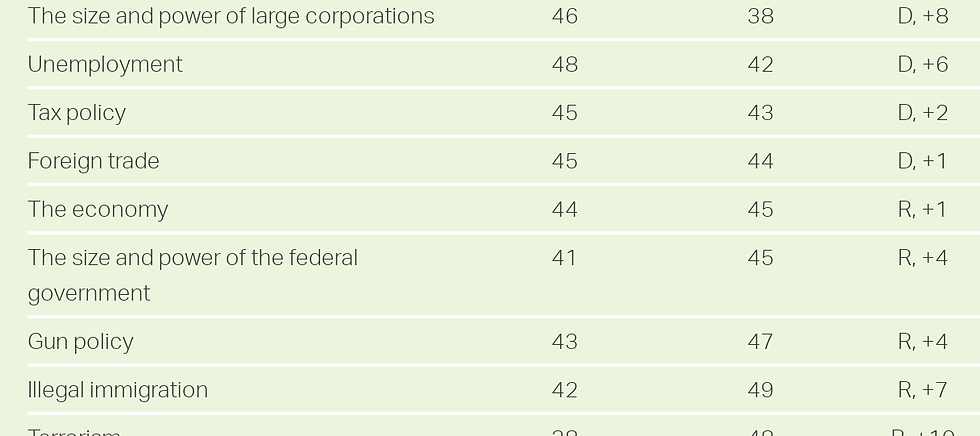Issue Ownership: Do Parties 'Own' Specific Issues?
- charlottenoeljones
- Nov 8, 2021
- 3 min read

Issue ownership is the perception that one political party handles an issue better than the other. These issues can range from social justice to gas taxes to foreign policy. Which party gets deemed as a better fit for certain issues has a lot to do with how they have handled the issue in the past, their perceived success on the issue, and stereotypes about the party. To get a full picture of issue ownership, it is important to examine the scarce research on it, look at the public's perception of issue ownership, and research how political parties use issue ownership to help with reelection and their reputation.
For one of the biggest determiners in voting habits, there is little research on issue ownership. The first source of perceived issue ownership is party affiliation and partisanship. If an individual is a democrat, they already have a formed opinion about healthcare, so they will be more inclined to say the democratic party does better dealing with healthcare than the republican party. Another source of issue ownership is a party's proposed solutions to a specific problem and how well they execute them. Often, for specific problems issue ownership switches and can depend on how well a party is doing in the context of outside influencers like the economy, national security, and more. However, scholars have defined party constituencies, or who represents the party, as one of the defining deciders in issue ownership (Stutbager and Slothuus, 2021).


Voters believe democrats and republicans are better at handling certain issues. Typically, democrats are perceived to be better at issues that deal with issues that are nurturing such as education, healthcare, racism, and republicans are perceived to be better at issues that keep citizens safe like stopping terrorism and strengthening security. However, there are specific issues voters are on such as which party deals with the economy better or taxation. Public perception of issue ownership will also influence individual voting habits (Reinhart, 2017).

Moreover, politicians use public perceptions of issue ownership to their advantage in elections. Politicians will talk about issues they are perceived as owning and focus on them more because they appear to be efficient. Moreover, parties will focus on issues that appeal to their demographic. So, because 56% of women identify as democratic, left leaning politicians will take a pro-abortion stance to keep the democrat women and to real in more female voters who may be moderate. Moreover, democrats push pro-immigration policies and support social justice movements like Black Lives Matter because they have a more racially diverse demographic. Currently, 84% of African American voters and 63% of Hispanic voters vote blue (“1. Democratic Edge in Party Identification Narrows Slightly,” 2020). Pandering to voters is a key part in getting reelected, creating a connection with voters, and seem responsive to concerns (Carson & Jenkins, 2011).
In conclusion, issue ownership is an integral factor for who votes for what party. Despite what little research there is on issue ownership, a few important things have been determined. Scholars have defined the sources of issue ownership, what issues are contributed to what party, and how and why politicians use issue ownership to their advantage.
Citations
1. Democratic edge in party identification narrows slightly. (2020, June 2). Pew Research Center - U.S. Politics & Policy. https://www.pewresearch.org/politics/2020/06/02/democratic-edge-in-party-identification-narrows-slightly/
Carson, J., & Jenkins, J. (2011). Examining the Electoral Connection Across Time. Annual Review of Political Science. Retrieved November 8, 2021, from https://www.annualreviews.org/doi/pdf/10.1146/annurev-polisci-030310-221852
Stubager, Rune & Slothuus, Rune. (2012). What Are the Sources of Political Parties’ Issue Ownership? Testing Four Explanations at the Individual Level. Political Behavior. 35. 10.1007/s11109-012-9204-2.



Comments